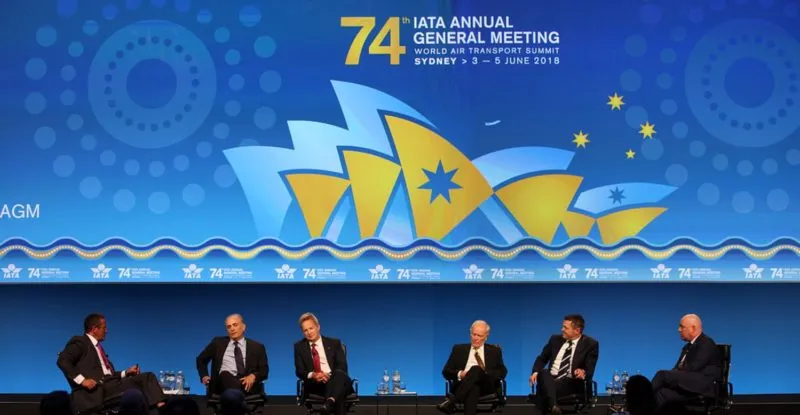Talk about gender diversity — and diversity on the whole — during the IATA Annual General Meeting in Sydney this week highlights an all too common paradox in the struggle for equity and representation: those directing the conversation have no idea what they are talking about.
This was evident during the CEO panel hosted by CNN journalist Richard Quest — six guys in suits debating what to do about the ‘woman problem’ in aviation. From the start, it was hopeless. The wringing of hands, the frowns of concern.
These men face an insurmountable dilemma. We are asking them to turn into fish and ride bicycles.
One CEO encapsulated the statements others have made and endeavored to present a helpful strategy for the inherent weakness in ‘woman’ which complicates gender equality.
Air Canada CEO Calin Rovinescu said:
It’s a totally legitimate question and it’s not one that gets solved over night and, in my opinion, it’s not one that gets solved with quotas. It gets solved by having leadership teams put in place…programs. In our case, what we’ve done is that we’ve taken women leaders and put them outside their comfort zone. It used to be that if you were a woman leader in an airline you could aspire to be leaders of corporate communications, maybe head of the legal branch, you could aspire to be head of insurance, but not necessarily head of operations or flight operations, maintenance and those kinds of historically, traditionally non-female leadership roles.
I would say that one of the things where we’ve had success at many levels of leadership is where you take someone out of her comfort zone, put her into a position and then ensure that does not become a stumbling block when the fifteen years, when the ten years, when the five years passes to get to the next level. I totally agree [that we need more women represented] and hope that there’s a panel like this several years from now where there will be more women.
There’s a lot to unpack here. I would like to open the trunk.
First, this C-spot — or comfort zone — does not exist. It is a myth. Women do not have prescribed gender-driven tendencies or preferences for certain jobs over others, any more than men do. There are a whole variety of women in this world because women are people and people are different. Some are more ambitious than others. Some are more driven than others. Some are more aggressive than others. But women have long been subjugated to roles which are less well-paid than the positions men want to keep for themselves. It is a simple matter of money and power. This fiction of a ‘comfort zone’ will keep the C-suite looking like it does today ten years from now — or longer — unless we call it what it is: inherent bias.
Let’s also talk about agency. Women do not need to be “put into a position”. This implies that they lack the drive to claim the position that they want. This is the very definition of patronization. Women — like all underrepresented people — know what they want and are only asking that, when they pursue advancement they are taken as seriously as their privileged counterparts.
Women are not naturally drawn to positions in customer service, HR or whatever by instinct or nature. They do not shy away from strategy, maintenance, science or technology because they’re afraid of being burned or breaking a nail. Women have been cutting fresh paths in these fields for centuries — despite being undermined and sometimes having their IP appropriated by males.
Just like men, some women are more interested in leadership roles than others. But many of those who would lead are relegated to following by the intentional blindness of institution. This is a chronic, systemic affliction, the disability of those in power to see the person right in front of them waiting to take their chair.
Last, let’s unpack those years. If a woman (or any other person trapped in one of the ‘uncomfortable slots’ that society has constructed) pushes for diversity, parity and equity, there is an inevitable delay — a five-ten-twenty year sentence of patience. There’s never a deadline to it. It’s always only ever five, ten or fifteen years away.
I’ll let one of history’s greatest feminists take this one on:
“Tomorrow, and tomorrow, and tomorrow,
Creeps in this petty pace from day to day,
To the last syllable of recorded time;
And all our yesterdays have lighted fools
The way to dusty death. Out, out, brief candle!
Life’s but a walking shadow, a poor player,
That struts and frets his hour upon the stage,
And then is heard no more. It is a tale
Told by an idiot, full of sound and fury,
Signifying nothing.”
In Spanish, we say it shorter: from tomorrow to tomorrow the sheep loses all wool. As we Lean-In to help our sisters, let’s be careful not to get fleeced.
The status will continue to ‘quo’ as long as we let it. We cannot expect people in positions of power to have answers. They are unqualified, clueless, lost, compromised by their own self-interest. When it comes to diversity, it’s time to let the experts drive the agenda.
As an example of what can happen when you let CEOs talk about matters beyond their ken, His Excellency Akbar Al Baker made an uncomfortable and inappropriate remark to a woman journalist from the UAE today, explaining that a woman couldn’t do his job because it is too difficult.
Frankly, I personally find this candor refreshing. I’d much rather have an obvious slip from a man without a functioning filter than a well crafted statement from someone who is Photoshop-brushing the patriarchy.
To IATA’s credit, they ensured there were women represented on the AGM agenda to share their own perspectives. It is part of a larger drive by the association to stretch the field to fit more women and to make aviation more diverse in general. It is a sign of progress, and really very easy to do. There are so very many talented and underrepresented people out there. Let’s hear more from them.
Image at top courtesy IATA press gallery
Related Articles:
- Op-Ed: A woman’s place is in the flight deck and the C-Suite
- Europe’s EESC unveils Platform for Change to improve gender equality
- Pursuing Leadership: Delta SVP Allison Ausband’s advice to women
- Galley Support Innovations CEO embraces uniquely holistic approach
- Aviation and tech company chief seeks to increase women in both fields
- Charlie Bravo Aviation CEO to women: Push beyond your comfort zone
- Airbus CEO answers lack of senior women, ethnic minorities
- Op-Ed: All-male APEX emerging tech panel needs women’s voices
- Nok Air CEO: Bring on the women












